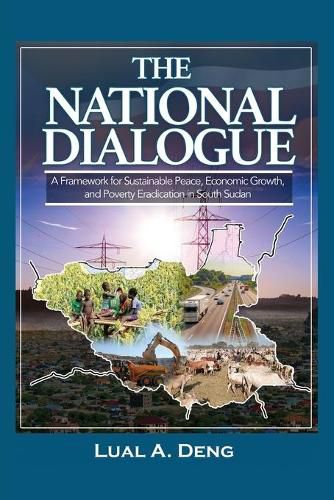Readings Newsletter
Become a Readings Member to make your shopping experience even easier.
Sign in or sign up for free!
You’re not far away from qualifying for FREE standard shipping within Australia
You’ve qualified for FREE standard shipping within Australia
The cart is loading…






This title is printed to order. This book may have been self-published. If so, we cannot guarantee the quality of the content. In the main most books will have gone through the editing process however some may not. We therefore suggest that you be aware of this before ordering this book. If in doubt check either the author or publisher’s details as we are unable to accept any returns unless they are faulty. Please contact us if you have any questions.
DR. LUAL DENG provides in this book a powerful narrative of a national conversation among the people of South Sudan about the challenges and opportunities for overcoming the crises of leadership and governance since independence on July 9th, 2011. The National Dialogue has been both a forum and a process in which the people of South Sudan have expressed their views, through an inclusive participatory conversation, about what has gone wrong with the binding narrative-at independence-of triumph and freedom. This inclusive participatory conversation has been from the grassroots, to the National Dialogue Conference, through Regional Conferences, all facilitated by a credible convener in the form of a Steering Committee under the able leadership of H.E. Abel Alier and Hon. Angelo Beda. Lual Deng, one of the policy analysts that provided technical backstopping to the Steering Committee, narrates in this book the structure and the process of the National Dialogue. He illustrates how the political space created by the National Dialogue process has enabled ordinary people to have a say in the identification of the root causes of the crises on the one hand, and to recommend desired solutions on the other. Failures of governance, security, the economy, and social cohesion are identified in the book as the sources of the persistent crises in South Sudan. This new consensus from the inclusive participatory national conversation means that the National Dialogue now stands as a compelling framework for sustainable peace, economic growth, and poverty eradication in South Sudan. This framework, according to the narrative of this book, is a function of visionary leadership and resilient institutions for effective governance. This book is, as Professor Daniel Bromley-who is one of the professors of Lual Deng-writes in the foreword, a clear and inspiring road map for the political class to implement the resolutions of the National Dialogue Conference.
$9.00 standard shipping within Australia
FREE standard shipping within Australia for orders over $100.00
Express & International shipping calculated at checkout
This title is printed to order. This book may have been self-published. If so, we cannot guarantee the quality of the content. In the main most books will have gone through the editing process however some may not. We therefore suggest that you be aware of this before ordering this book. If in doubt check either the author or publisher’s details as we are unable to accept any returns unless they are faulty. Please contact us if you have any questions.
DR. LUAL DENG provides in this book a powerful narrative of a national conversation among the people of South Sudan about the challenges and opportunities for overcoming the crises of leadership and governance since independence on July 9th, 2011. The National Dialogue has been both a forum and a process in which the people of South Sudan have expressed their views, through an inclusive participatory conversation, about what has gone wrong with the binding narrative-at independence-of triumph and freedom. This inclusive participatory conversation has been from the grassroots, to the National Dialogue Conference, through Regional Conferences, all facilitated by a credible convener in the form of a Steering Committee under the able leadership of H.E. Abel Alier and Hon. Angelo Beda. Lual Deng, one of the policy analysts that provided technical backstopping to the Steering Committee, narrates in this book the structure and the process of the National Dialogue. He illustrates how the political space created by the National Dialogue process has enabled ordinary people to have a say in the identification of the root causes of the crises on the one hand, and to recommend desired solutions on the other. Failures of governance, security, the economy, and social cohesion are identified in the book as the sources of the persistent crises in South Sudan. This new consensus from the inclusive participatory national conversation means that the National Dialogue now stands as a compelling framework for sustainable peace, economic growth, and poverty eradication in South Sudan. This framework, according to the narrative of this book, is a function of visionary leadership and resilient institutions for effective governance. This book is, as Professor Daniel Bromley-who is one of the professors of Lual Deng-writes in the foreword, a clear and inspiring road map for the political class to implement the resolutions of the National Dialogue Conference.